AHOGÁNDOSE EN MENTIRAS
04.10.2024

Una diosa del mar ahogada en gas natural licuado1Con una pared de llamas y un grupo de misteriosos representantes de la industria del petróleo y el gas, Ocean Rebellion crea un espeluznante cuadro de dolor para poner de relieve el lavado verde de la industria petrolera. Gas natural licuado (GNL) por SEA-LNG y algunos Estados miembros de la Organización Marítima Internacional de la ONU (IMO).
Junto a la Monumento Internacional a la Gente de Mar en el Albert Embankment, nuestros artistas desvelaron un nuevo e impactante espectáculo destinado a arrojar luz sobre la grave crisis que azota al sector naval.
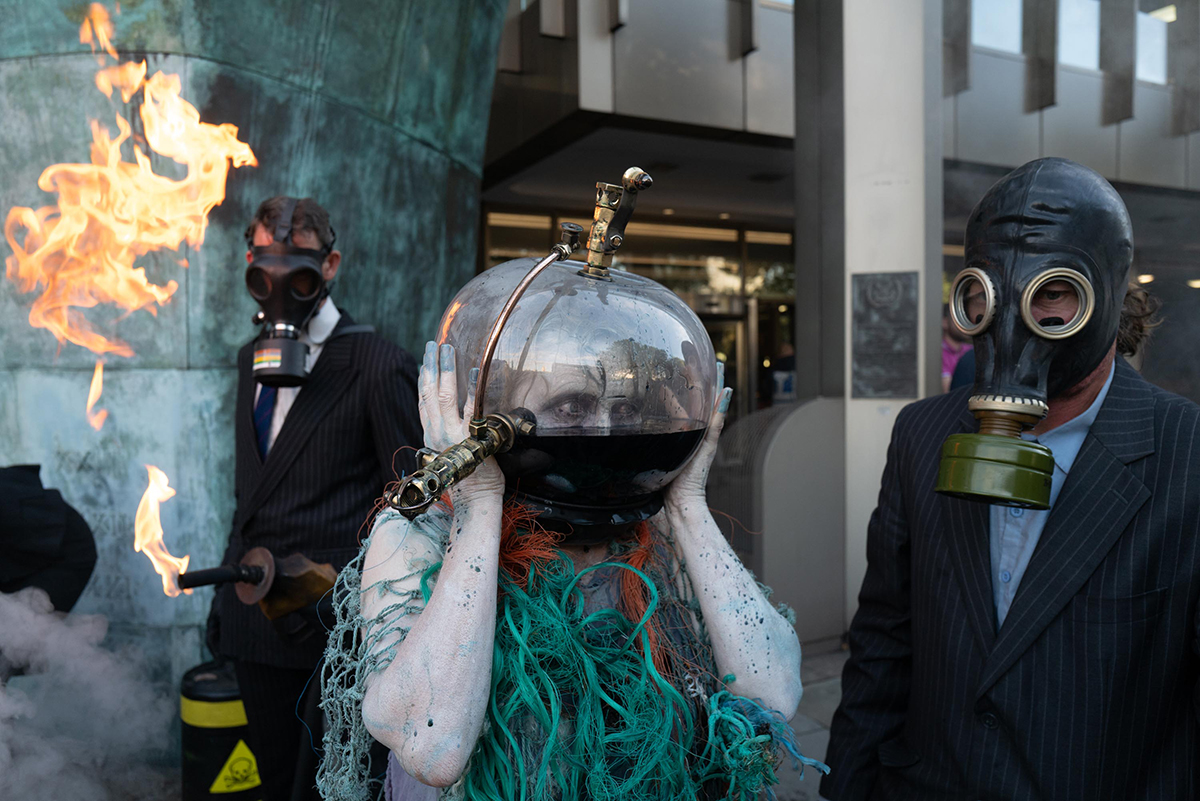
⬆️ Mientras el casco se llena, la diosa muere. Las sucias mentiras del GNL están llevando a la OMI a un carretera al infierno. Foto João Daniel Pereira.
La pieza central de la representación era el "ahogamiento" de una diosa oceánica, con la cabeza atrapada en un casco translúcido, una pecera que se llenaba lentamente de muerte. Figuras con máscaras de gas de Shell LNG, miembro de SEA-LNG, utilizaron maquinaria para llenar lentamente el casco con GNL, sumergiéndolo. A ambos lados, los ejecutivos de Oil and Gas lanzaron chorros de llamas y petróleo. El espectáculo culminó con la inmersión completa de la diosa, una denuncia de la incapacidad de la OMI para proteger los océanos, su continua manipulación por la industria de los combustibles fósiles y el transporte marítimo, y un conmovedor preludio de la última jornada de la Conferencia de las Naciones Unidas sobre el Medio Ambiente y el Desarrollo. MEPC82 reuniones.
El destino del Océano depende de todos nosotros.
Nuestras intervenciones dependen de su apoyo.
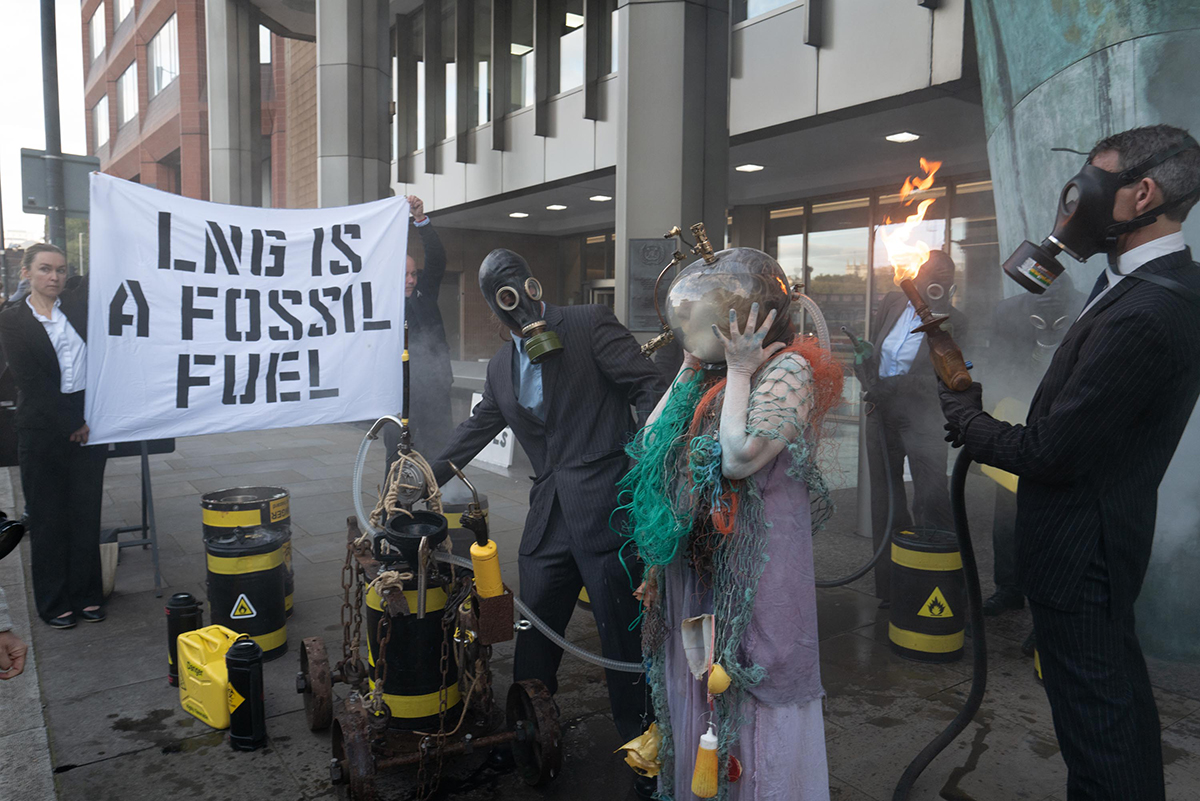
⬆️ El GNL es un combustible fósil, así de simple. Foto João Daniel Pereira.
Ocultándose tras los informes sobre el bioGNL, GNL MARINO ha tenido mucho éxito en la venta de GNL como combustible ecológico, a pesar de que el bioGNL es caro y escaso (lo que significa que el GNL fósil es el gas de elección) y todavía causa emisiones de metano a lo largo de su cadena de suministro y uso.
Han tenido tanto éxito que empresas como Maersk, Royal Caribbeany MSC han sido promocionando sus buques como "verde" y vender esta mentira al público en general. El GNL no es un combustible ecológico. Es más, la OMI está convencida de esta mentira y no hace nada para impedir que el GNL se convierta en el combustible fósil preferido para el transporte marítimo. Solo en la Unión Europea, el consumo de GNL por parte de los buques se ha duplicado, pasando de 2,2 millones de toneladas (Mt) en 2018 a 4,4 Mt en 2022. La aceptación del GNL se basa en la idea engañosa de que es un combustible alternativo y limpio. Aquí es donde los defensores del GNL se dedican al gaslighting, engañando al sector marítimo y a todos nosotros.
El gaslighting es una forma de manipulación psicológica utilizada para hacerte dudar de tus propias percepciones y cordura, a menudo distorsionando los hechos o la realidad. Los partidarios del GNL emplean tácticas de gaslighting, como la financiación de investigaciones y la cita selectiva de estudios que apoyan su narrativa. mientras desacredita a los investigadores que destacan los riesgos del GNL. También están socavando las voces disidentes de la comunidad y los líderes de opinión tachándolos de "alarmistas" u "obstruccionistas".
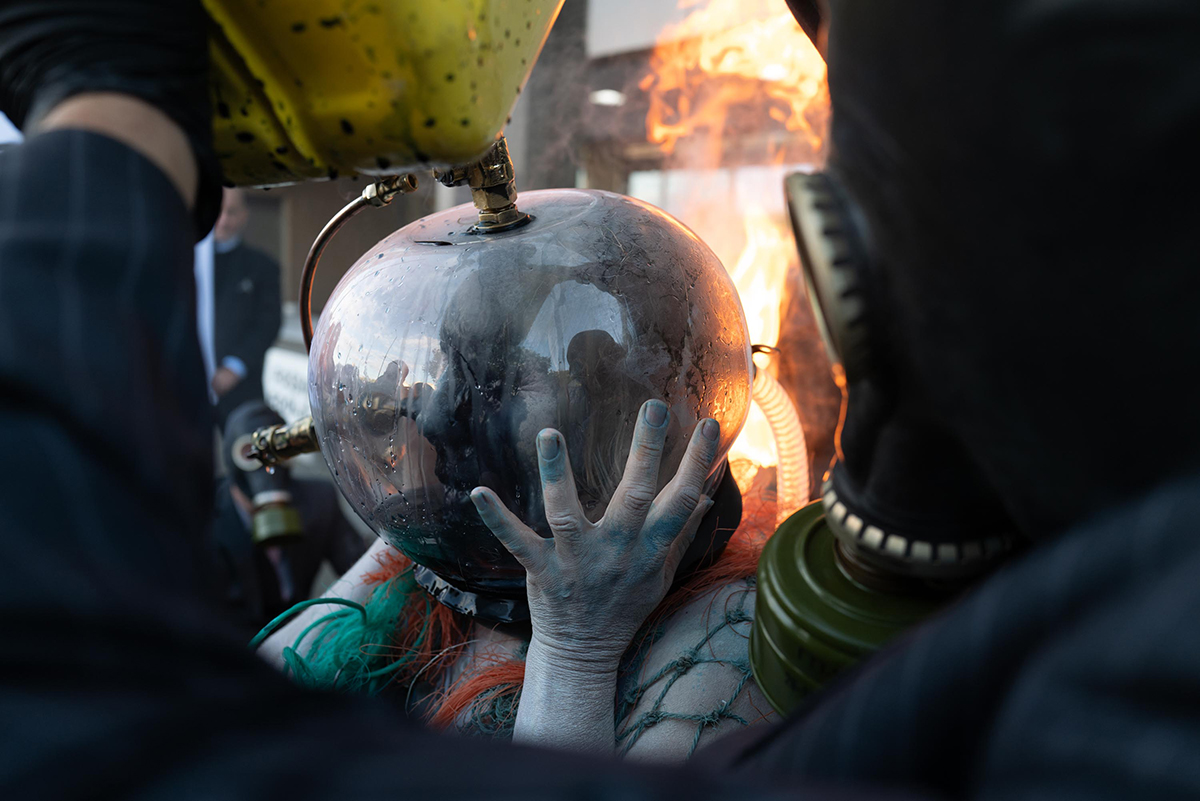
⬆️ Gaslighting by SEA-LNG es a la vez engañosa y potencialmente ilegal para los afiliados, dadas las recientes normas de la FCA que exigen los servicios se describen con precisión. Foto João Daniel Pereira.
Al ser miembros de SEA-LNG empresas como Shell LNG, Lloyd's Register y Maersk, están incurriendo en un "gaslighting" mientras hacen declaraciones de sostenibilidad. Esto puede estar violando sus responsabilidades legales a los accionistas y se arriesgan a litigios si tales riesgos materiales, incluido el riesgo de litigio, no se reflejan adecuadamente en sus cuentas auditadas. Igualmente, agencias de calificación crediticia que no detectan este "lavado verde" tampoco ofrecen información precisa sobre sostenibilidad a sus abonados del sector financiero.
Por no mencionar el incumplimiento de las responsabilidades éticas con las partes interesadas en general para evitar el colapso del clima, la naturaleza y la sociedad por medio del metano fugitivo, y las emisiones de carbono fósil, que resultan del GNL. Lejos de ser limpio, el GNL es uno de los combustibles más sucios que existen. Presumir de que es un combustible limpio es una mentira tecnológica.
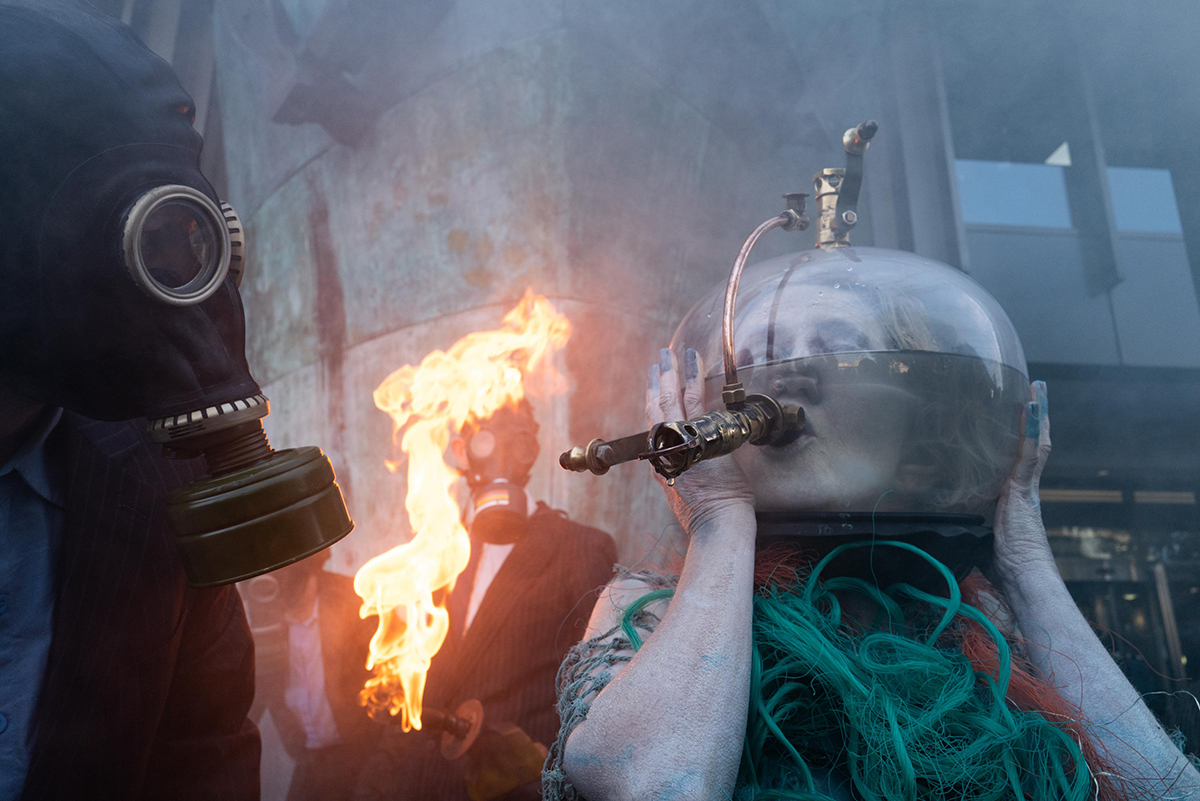
⬆️ La Diosa del Mar da un último suspiro antes de sucumbir a la mezcla tóxica de GNL fósil y biológico. Foto João Daniel Pereira.
Gas natural licuado (GNL) - los hechos
El GNL es un combustible fósil que, cuando se extrae, se transporta y se quema como combustible marino, deja escapar metano a la atmósfera, un gas peligroso para el calentamiento global que está sobre 80 veces más calentamiento del clima a corto plazo que el dióxido de carbono.
El Grupo Intergubernamental de Expertos sobre el Cambio Climático (IPCC) de la ONU identificado la rápida reducción de las emisiones de metano como una de las principales prioridades para limitar el calentamiento global a un nivel lo más cercano posible a 1,5°C. El IPCC último informe centrarse en la mitigación del clima deja claro que el gas fósil en forma de GNL no es una solución para la descarbonización del transporte marítimo.
En contra de lo que exige la climatología, las compañías navieras y portuarias han ido a toda máquina en la dirección equivocada, invirtiendo fuertemente en GNL fósil, alegando que el combustible reducirá su impacto medioambiental y la contaminación climática. Actualmente hay más de 785 nuevos cargueros encargados en todo el mundo, de los cuales más de 400 se están construyendo para funcionar con GNL fósil.
Quemar más GNL fósil a bordo de los buques es un desastre en ciernes para nuestro planeta. Sólo aumentaría las emisiones de metano de los buques, que ya rosa por 150% entre 2012 y 2018, según la Organización Marítima Internacional (OMI) de la ONU.
Las emisiones de metano también disminuyen la calidad del aire y el aumento de la demanda de GNL -incluido el sector marítimo- provoca efectos adversos en tierra, como la contaminación del agua potable, la reducción de la producción agrícola y el aumento de las tasas de mortalidad prematura.
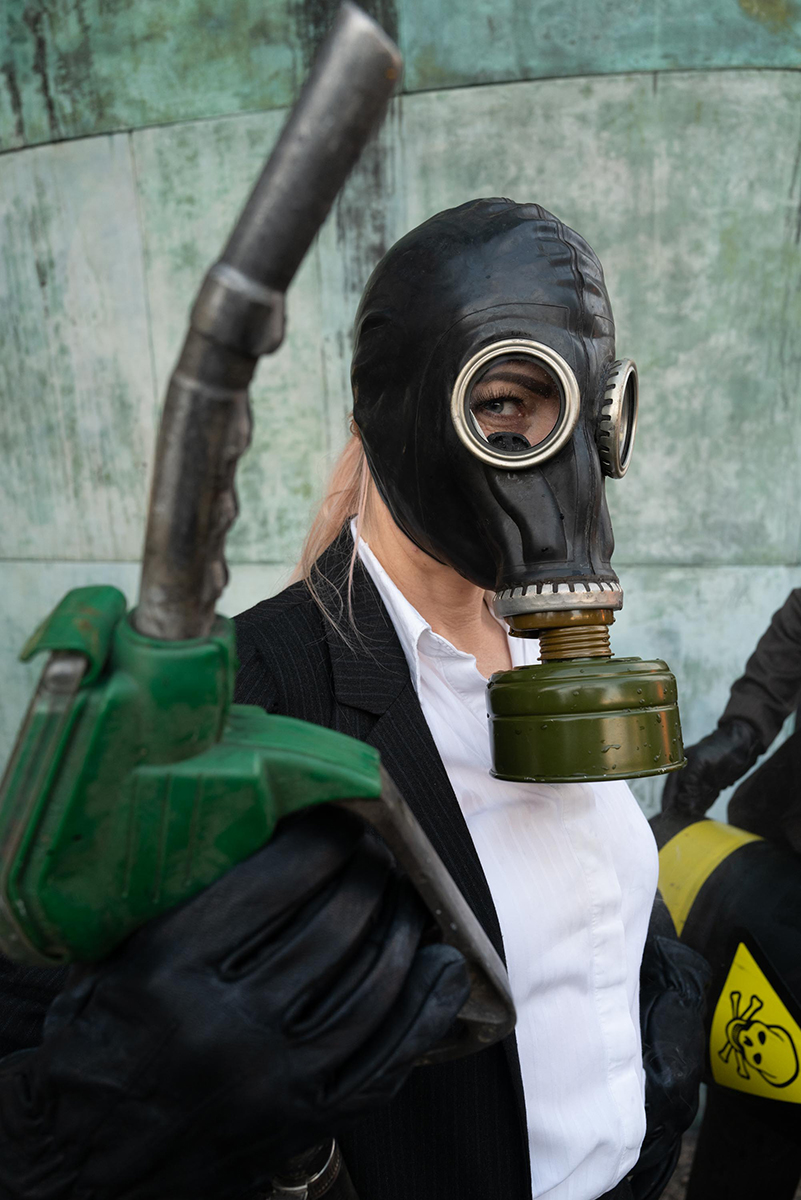
⬆️ Un ejecutivo gasista disfrazado de Shell LNG demuestra cómo Se producen llamaradas de GNL (todo el tiempo) utilizando una bomba de aceite. Foto João Daniel Pereira.
Necesitamos una normativa estricta sobre el metano en la OMI
Según la IPCC (AR6)Para hacer frente a la emergencia climática y a sus devastadores efectos sobre las personas es necesario abordar urgentemente las emisiones de metano a corto plazo. Los defensores del GNL están engañando a los responsables políticos sobre la magnitud real de sus efectos sobre el clima y la salud, al tiempo que ponen en peligro un futuro habitable en este planeta.
La Organización Marítima Internacional es el organismo de las Naciones Unidas que regula el transporte marítimo internacional. En la actualidad, no existe ninguna normativa internacional específica para las emisiones de metano de los buques.
Llamamiento a la acción en la OMI:
El GNL es un combustible fósil que afecta negativamente a las personas, el medio ambiente y el clima en todas las fases de su ciclo de vida.
Exigimos:
1. Los Estados miembros de la OMI reconocen este hecho y dejan de escuchar a los GNL MARINO grupos de presión.
2. Todas las empresas implicadas en la promoción del GNL son sometidas a escrutinio para determinar si incumplen sus Objetivos de Sostenibilidad Medioambiental.
3. La OMI para promover la eficiencia y el uso de embarcaciones de vela y propulsión eléctrica incentivando la incorporación al sector del transporte marítimo, capacitando y mejorando las cualificaciones de los trabajadores e introduciendo rutas marítimas más justas.
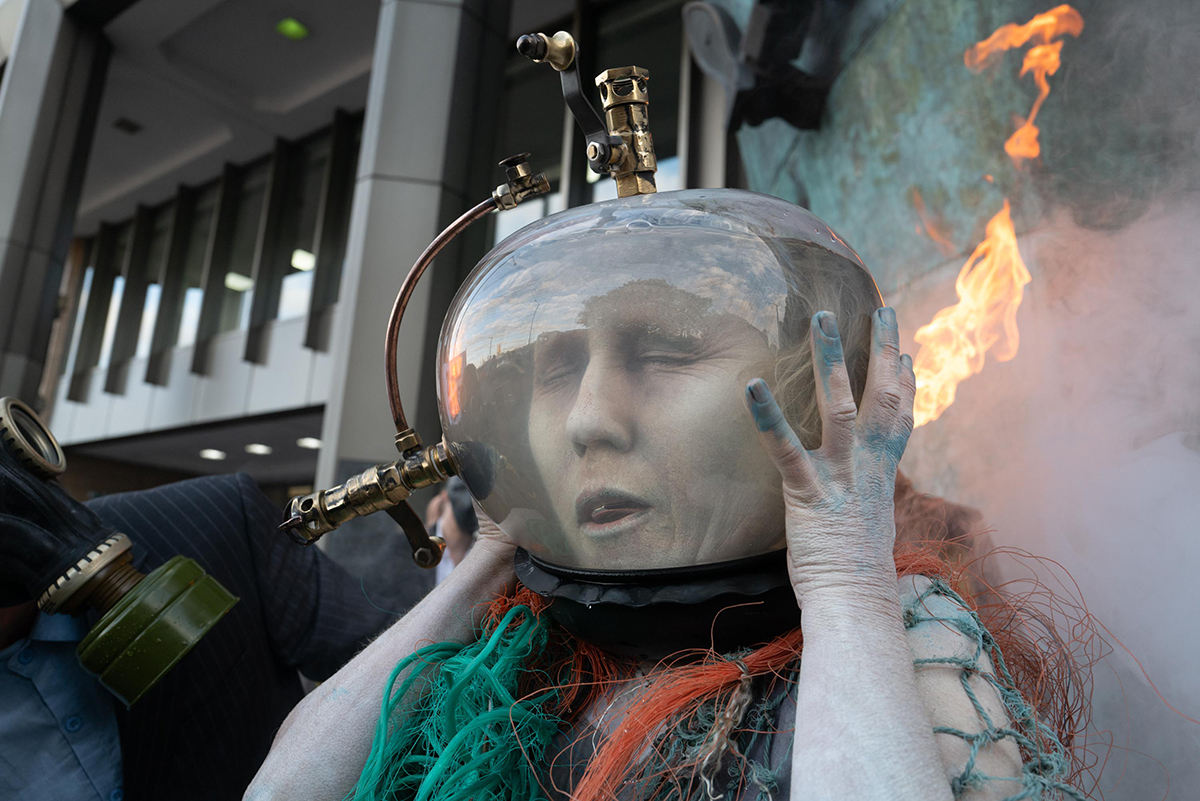

⬆️ El mundo se muere ante nuestros ojos. Foto João Daniel Pereira.
1. A diferencia de SEA-LNG, nosotros no mentimos sobre lo que hacemos. No utilizamos GNL para ahogar a la Diosa del Mar, eso sería un asesinato. En su lugar utilizamos agua inofensiva.